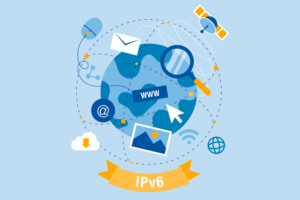
Source: Freepik
The Internet, which provides us with information, entertainment and communication options on a daily basis, is based on a complex system of protocols and addressing. IP addresses play a crucial role in the architecture of the Internet. Internet Protocol version 4 (IPv4) was originally developed for this purpose and has successfully managed data traffic on the Internet for many years. However, with the constantly growing number of IP addresses required, IPv4 reached its limits. To meet these challenges and support the future development of the Internet, Internet Protocol Version 6 (IPv6) was introduced. As a renowned university, RWTH Aachen University strives to keep pace with this development. For this reason, we are planning to commission the license servers for software via IPv6.*
Background
IPv4 addresses consist of 32 bits. Therefore, a maximum of 4 billion addresses can be formed, which ultimately led to a shortage of addresses. The Internet Protocol Version 6 (IPv6) was created in response to this address shortage. The IPv6 consists of 128 bits. It enables the unique assignment of IP addresses for every device in the world.
The transition to this new protocol was initially slow, as only a few applications, hosts and networks initially offered the necessary support. However, we are now seeing a significant shift as both leading technology providers and service providers make the transition.
What is changing?
From February 16, 2024, RWTH will start a beta operation for the license servers for software over IPv6. The license servers can be reached via a new additional Fully Qualified Domain Name (FQDN), which is communicated when the software is purchased.
With some programs, it can happen that the direct entry of the FQDN is not resolved correctly despite being entered. In this case, the IPv6 address of the license server must be entered. A list of license servers that are currently accessible under IPv6 can be found on IT Center Help.**
Limitations in beta operation
Only license servers that have been successfully tested for IPv6 compatibility are included in beta operation. In the case of FlexLM, for example, a widely used license management system used by various software manufacturers, IPv6 is already supported by the main component. However, it is up to each manufacturer to decide how this component is implemented in their own license software. Therefore, not all license servers based on FlexLM are automatically compatible with IPv6. This leads to technical hurdles for some license servers, which are due to a lack of implementation on the part of the software manufacturers.
Prospects
Hosted license servers are excluded in this limited beta. We are aware that this does not cover some widely used software products. We are already in active contact with the manufacturers in order to overcome these challenges. However, due to the technical circumstances of the individual license servers, we are unable to provide an exact date or a concrete forecast at this time.
Responsible for the content of this article are Stéphanie Bauens and Weng Gyang.





Vielen Dank für die informative Mitteilung zum IPv6 Beta-Betrieb an der RWTH Aachen. Es ist schön zu sehen, dass man mit technologischen Entwicklungen Schritt hält und die Umstellung auf das zukunftsfähige IPv6-Protokoll vorantreibt.
Mir ist aufgefallen, dass die Überschrift des Artikels recht allgemein gehalten ist. Dabei bezieht sich die Nachricht spezifisch auf die Netzwerklizenzserver. Könnten Sie vielleicht erläutern, warum für diese Ankündigung eine so breite Formulierung gewählt wurde? Wie ich verstehe, ist der Einsatz von IPv6 ja bereits an verschiedenen Stellen innerhalb der RWTH implementiert.
Des Weiteren wäre ich daran interessiert, ob es in naher Zukunft weitere Informationen zum Thema IPv6 an der RWTH geben wird, sei es im Blog oder an anderer Stelle.
Hallo Arnt Jakuv,
vielen Dank für dein Interesse und deine Aufmerksamkeit bezüglich unseres Beitrags zum IPv6 Beta-Betrieb an der RWTH Aachen.
Die Entscheidung, eine allgemeine Überschrift zu wählen, lag darin begründet, dass wir den Fokus auf die Gesamtheit des IPv6-Übergangs legen wollten. Auch wenn der Beitrag spezifisch auf die Netzwerklizenzserver eingeht, ist es wichtig zu betonen, dass der IPv6-Beta-Betrieb ein Teil eines umfassenderen Prozesses ist, der die gesamte Infrastruktur der RWTH betrifft. Diese umfassende Perspektive ermöglicht es uns, die Bedeutung des IPv6-Übergangs für die gesamte Hochschulgemeinschaft hervorzuheben.
In Bezug auf weitere Informationen zum Thema IPv6 an der RWTH freuen wir uns, dir mitteilen zu können, dass wir in Zukunft weitere Updates und Beiträge dazu veröffentlichen werden, sowohl hier im Blog als auch auf unseren Social-Media-Kanälen. Es ist unser Ziel, unsere Community gänzlich über unsere Services zu informieren und eventuelle Fragen zu klären.
Viele Grüße
das IT Center Blog Team